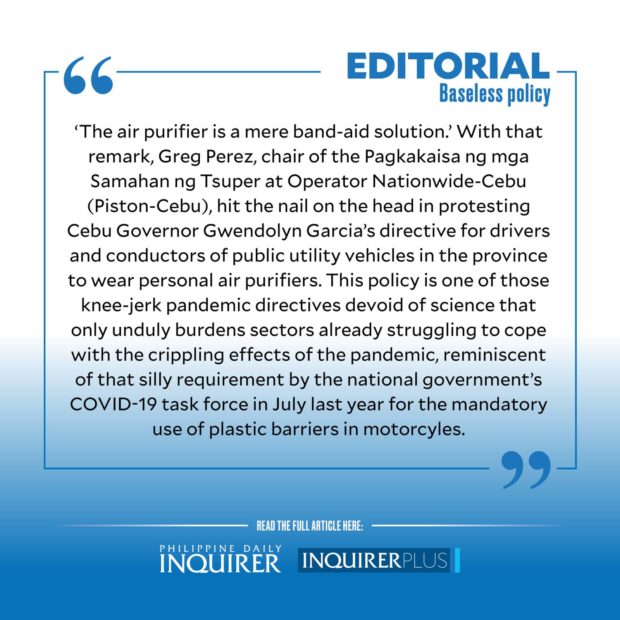
“The air purifier is a mere band-aid solution.”
With that remark, Greg Perez, chair of the Pagkakaisa ng mga Samahan ng Tsuper at Operator Nationwide-Cebu (Piston-Cebu), hit the nail on the head in protesting Cebu Governor Gwendolyn Garcia’s directive for drivers and conductors of public utility vehicles in the province to wear personal air purifiers.
Garcia issued two executive orders last week, one requiring the wearable air purifiers for drivers and conductors, and the other mandating transport operators to install high efficiency particulate air (Hepa) filters in their PUVs. The policy was to take effect on Aug. 16 but was moved to tomorrow (Aug. 25), to allow the transport sector to buy the air purifiers.
This policy is one of those knee-jerk pandemic directives devoid of science that only unduly burdens sectors already struggling to cope with the crippling effects of the pandemic, reminiscent of that silly requirement by the national government’s COVID-19 task force in July last year for the mandatory use of plastic barriers in motorcycles.
Despite warnings from various experts that the contraption was not only ineffective but would also even pose risks to riders, Interior Secretary Eduardo Año rebuked critics then with a classic non sequitur:
“Assess the issue before making comments, and wait until you get infected with COVID before you comment.’’
Eventually, the government came to its senses and peremptorily abandoned the policy—but not before some motorcycle riders had already shelled out money for the pointless barriers.
That fate is now set to befall Cebu transport workers, too, by tomorrow. Garcia’s baseless but costly policy would force them to cough up the extra cost of paying for the wearable air purifiers, which range from P500 to P2,000 or even P8,000. These drivers and conductors earn at best P300 a day.
Per a report in this paper, it was agreed during a meeting between Garcia and PUV operators last week that the operators will buy the gadgets for their drivers and conductors. While some operators decided to give the gadgets for free, the others asked their workers to pay on an installment basis.
Further, the governor reportedly told operators that they could buy the devices through a supplier in Cebu, though its price was higher compared to online shops.
What was the basis for requiring the use of personal air purifiers in the first place?
Garcia claimed in a press conference: “Our established health protocols turn to science and technology—to air purifiers, that in fact, create a safer atmosphere in that, negative ions that catch virus, pollens, microbes, bacteria and neutralize it—can be achieved through the air purifiers with HEPA filters and personal air purifiers.’’
“You can do your research. This adds protection, I tell you,’’ she added.
There is no evidence to support such claims. The Department of Health has clarified that the gadgets do not provide protection against COVID-19 and could even give the user a false sense of security.
“We do not recommend the use of necklace air purifiers because based on evidence and experts, it does not provide protection,” Health Undersecretary Maria Rosario Vergeire said. “While it is not harmful, it does not provide protection against COVID-19.’’
Health Desk, the public health arm of the technology nonprofit group Meedan, also stated that mini air purifiers worn around the neck “have not been shown to prevent COVID-19 infection and there have been no studies about their effectiveness to date.”
Cebu, which has registered high COVID-19 cases and deaths that recently overwhelmed its private crematoriums and public cemetery, obviously needs more than useless gadgets in fighting the pandemic.
“What the people need now is to hasten the distribution of free and safe vaccines, and free swab testing. Mass testing and contact tracing should also be strengthened, and treatment for COVID-19 positive patients should be free,” said Perez. If Garcia really wanted the mandatory use of the purifiers, she should have given these for free, he added.
Jaime Paglinawan, chair of Alyansa sa mga Mamumuo sa Sugbo-Kilusang Mayo Uno, echoed that sentiment: “People are clamoring for financial assistance, faster distribution of free vaccines, free mass testing and free treatment for individuals in the transport sector who have tested positive for COVID-19.’’
Garcia earlier caused a ruckus when, in May, she insisted on testing arriving passengers upon arrival and requiring a shorter quarantine, in defiance of the rules set by the Inter-Agency Task Force for the Management of Emerging Infectious Diseases to prevent the transmission of COVID-19 variants. As a result, Malacañang ordered that flights be diverted to the Naia until June 5.
How did Garcia defend her action then? She said she was just “trying to look for the best possible way to implement policies that will not further burden our people.’’


